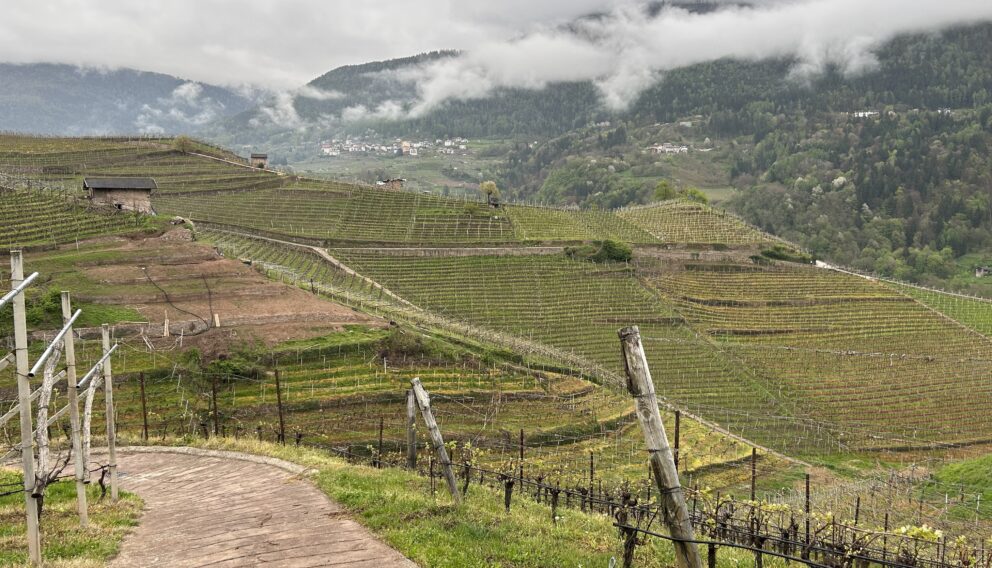Songs out of season: Climate change and the changing rhythms of wine production

Text & photo: Kaj Ahlsved
The first thing that struck me when we drove up by bus from Trento to Cembra was that the slopes were filled with structures for cultivating various types of grapes for wine production. For winegrowers, climate change is a reality and brings new challenges — for example, drought, heat, heavy storms, and new insects — meaning that growers must adapt to a new reality (see e.g. van Leeuwen 2024).
In conversations with local people in Cembra, the effects of the changing climate on viticulture was also highlighted — for instance, that new harmful insects have appeared, but also that harvesting can now take place earlier: the seasonal rhythm of winemaking has changed. How does this then reflect in the soundscape?
For example, the sounds associated with grape harvesting in the fields are now heard earlier. Previously, harvesting was done in October; now it already happens in September. “So what,” someone might think, “nowadays it’s just sounds from tractors and other tools.” But changes in human activity also have cultural implications: harvest fests are also moved, and the songs that are sung reflect a time that has passed. This incongruence between the present and the past appears, for example, in Canta Dei Mesi (“Song of the Months”) a specific song but also a music play where people would dress in costume to sing a verse of the song for each month of the year, thus connecting everyday life to the rhythms of the annual cycle of nature (Vikman 2009, p. 129).
A video in italian that presents the history of Canta dei Mesi.
When we stood sipping Cembra’s ”liquid gold” in one of our informants’ wine cellars, some singers from Cembra’s spontaneous choir pointed out that the verse for the month of October in Canta Dei Mesi no longer reflects reality. In it, one sings: “Ecco ottobre. La vendemmia ferve ai colli, ferve al pian […],” which in English can be translated to: “Here is October. The grape harvest is bustling in the hills, bustling on the plain […]”
In the song, whose current text dates from the 19th century, it is told how the harvest takes place in October and the hills and plains are filled with activities, as in people of all ages harvesting the grapes in wooden baskets usually carried on the backs. Sometimes even in snowy and slippery conditions.
One of the singers suggested that the text should perhaps be changed to September, but the decision has so far been made not to — so in Canta dei Mesi, the harvest still takes place in October. This means that the social, cultural, and even climate history of viticulture is reflected in the song lyrics. This is of course far from the only example where song lyrics reflect a past that does not sound as the present.
This inevitably made me think of a winter song well known to me as a Finland-Swede: Zacharias Topelius’ (1818–1898) “Skolgossens vintervisa” – “The Schoolboy’s Winter Song” (my translation). In the song, lively winter outdoor activities associated with the late 19th century are described, and the lyrics also depicts the sounds of for example skiing, skating, and kick sledding — sounds that are perhaps not just out of sync with the seasonal rhythms of the Anthropocene, like in Canta dei Mesi, but are increasingly disappearing sounds as winters are getting warmer. Or they might have moved physically elsewhere, to artificial winter conditions, just like curling in Cembra, which originally started up on lake Lago Santo. But more on that later.
References:
Vikman, Noora (2009) ”On the mountains, from the mountains, to the mountains –Polyphonic pasts, spaces and places of singing in a North Italian village Cembra. In Eds. H. Järviluoma, M. Kytö, B. Truax, H. Uimonen & N. Wikman. Acoustic Environments in change, 116–137.
van Leeuwen, C., Sgubin, G., Bois, B. et al. (2024) Climate change impacts and adaptations of wine production. Nat Rev Earth Environ 5, 258–275 (2024). https://doi.org/10.1038/s43017-024-00521-5